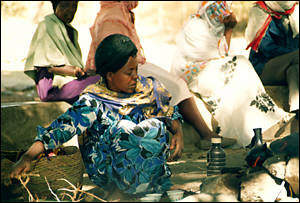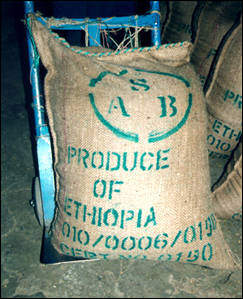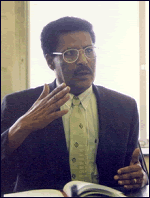 THE GOLDEN GOLD OF ETHIOPIA - COFFEE THE GOLDEN GOLD OF ETHIOPIA - COFFEE |

Following the structural adjustment program, a series of institutional changes have been made in thecoffee sub-sector. The Ethiopian Coffee Marketing Corporation that was engaged in domestic purchase and export of coffee was abolished and two separate enterprises were established. These were the Ethiopian Coffee Export Enterprise established under Council of Ministers Regulation No. 128/1993 and Ethiopian Coffee Purchase and Sales Enterprise established under Council of Ministers Regulation No. 127/1993. On the production side, the Coffee Development Corporation was also abolished and the Ethiopian Coffee Plantation Development Enterprise was established under Council of Ministers Regulation No. 151/1993.
In coffee production, smallholdings account for 95 percent of the total production. And state farms produce the remaining 5 percent.
Private investors are getting lately into this sector to reap the fruits of the golden coffee.
The share of foreign exchange earnings from coffee has increased from 58.9 percent in the pre-liberalisation period to 65.6 percent.
It is known that 1.5 million bags of coffee Arabica is consumed locally per year making the country the most substantial consumer in Africa.
 Creating encouraging investment atmosphere Creating encouraging investment atmosphere |
To keep multiplying the participation of the private sector, the government has brought and made into use several measures to eliminate discriminatory procedures against the private sector in tax, credit and foreign trade.
Private coffee exporters covered for 75 percent of the total coffee export (which has been less than 25 percent during the Dergue regime), while the remaining was the share of state-owned Ethiopian Coffee Exporter Enterprise.
Apart from taking various measures towards liberalizing the economy, the government has also already been taking new initiatives to encourage exporters and create a spirit of competition among them by awarding those who registered excellent performance in the sector.
 | Nejat International PLC, which is one of the World Investment News Ltdrs of trophy and certificate awards in the coffee sub-sector, has exported over 9300 tons of both washed and sundried coffee in the year 1997/98.
It has already started expansion and modernisation projects. Upon the completion of the expansion project, the factory will have the capacity to process 30,000 to 40,000 tons of coffee annually.
General Manager and sole owner of the company, Mr. Omer Ali Shifaw, who has been in the coffee business since 1973, is optimistic and determined to get involved in the coffee sector from coffee plantation to coffee export. He says, "In the coffee business, exporting by itself is not enough for our company.
We have to start at coffee plantation level. We have many competitors in the world, and we want to send the best coffee for our customers. For this reason, we need to focus on the quality of our exports starting from the beginning, i.e. the plantation."
 Rehabilitation in progress Rehabilitation in progress |
A low level of development has characterized the industrial sector in Ethiopia even by the standards of many least developed countries. This sector accounts for 11 percent of the GDP, 9.5 percent of total employment and 21.2 percent of export earnings.
Many factories have been operating for over 20 years with most of the equipment being second hand at the time of installation. Hence capital labor ratio may not indicate the capital intensity of the sector.

Metahara Sugar Factory, which was established during the Haile Sellassie regime, is located 193 km far from Addis Ababa. It has vast tracts of land on which there are many sugar cane plantations.
The factory has been selling sugar at controlled price during the Dergue regime but now sugar has become the only industrial product to be sold by auction.
During the military government, Metahara Sugar Factory was passive in its operational decision making. However, the present government has given full autonomy to the factory and it has undertaken a rehabilitation project very recently.
Mr. Belete Alemayehu, General Manager of Metahara Sugar Factory, says, "The future Metahara Sugar Factory production status is bright. What I really appreciate and what I am really happy and proud of the rehabilitation program we took over. After the rehabilitation took place, we are now able to produce 1 million quintal per year.
The factory is striving to win market for its final product and by products, and so far it is successful in getting some.
Mr. Belete says, " Our intention is to export more sugar. We are exporting molasses to Europe, especially to Germany. We annually produce about 400,000 quintal of molasses, which is purely for export, and not for local sale. Our aim, for the future, is export." |

